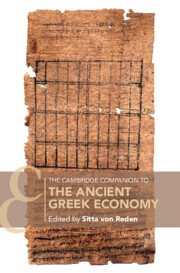Book contents
- The Cambridge Companion to the Ancient Greek Economy
- The Cambridge Companion to the Ancient Greek Economy
- Copyright page
- Contents
- Maps
- Notes on the Contributors
- Abbreviations
- Maps
- 1 Introduction
- Part I Diachronic Perspectives
- Part II Regional Perspectives
- 6 Asia Minor
- 7 Northern Greece and the Black Sea
- 8 Athens and the Aegean
- 9 Egypt and the Ptolemaic Empire
- 10 Hellenistic Babylonia
- Part III Structures and Processes
- Part IV Networks
- Part V Performance
- References
- Index
- Cambridge Companions to the Ancient World
7 - Northern Greece and the Black Sea
from Part II - Regional Perspectives
Published online by Cambridge University Press: 21 July 2022
- The Cambridge Companion to the Ancient Greek Economy
- The Cambridge Companion to the Ancient Greek Economy
- Copyright page
- Contents
- Maps
- Notes on the Contributors
- Abbreviations
- Maps
- 1 Introduction
- Part I Diachronic Perspectives
- Part II Regional Perspectives
- 6 Asia Minor
- 7 Northern Greece and the Black Sea
- 8 Athens and the Aegean
- 9 Egypt and the Ptolemaic Empire
- 10 Hellenistic Babylonia
- Part III Structures and Processes
- Part IV Networks
- Part V Performance
- References
- Index
- Cambridge Companions to the Ancient World
Summary
Northern Greece is much less well known than regions further south, and the Black Sea area is rarely referred to in works about historical economies. Despite this lack of modern curiosity about the region, its importance in economic terms cannot be underestimated. The southern parts of what is now Ukraine and Russia were one of the great bread baskets of the ancient Mediterranean, and merchants from various Greek islands, and coastal cities of the Aegean, shipped foodstuffs (wine, olive oil, nuts, fish products) in the opposite direction. Surviving written and archaeological evidence offers a very broadbrush picture of these relations. Inscriptions and graffiti from a limited number of exporting, recipient, or transshipment centres (notably Kallatis, Methone, Olbia, Pistirus, Thasos, Pantikapaion), give more detail and nuance, as well as pointing towards dimensions of these economic relations that have not fed back into the dominant economic models. The economic power of some players, notably Byzantium and Pantikapaion, as well as rulers of inland states, including Thrace, and cities of the Hellespontine Straits and Bosporus, deserve greater recognition. Lead letters and contracts, as well as commercial graffiti, also provide important data on the infrastructure of trade.
Keywords
- Type
- Chapter
- Information
- The Cambridge Companion to the Ancient Greek Economy , pp. 94 - 105Publisher: Cambridge University PressPrint publication year: 2022
- 1
- Cited by

